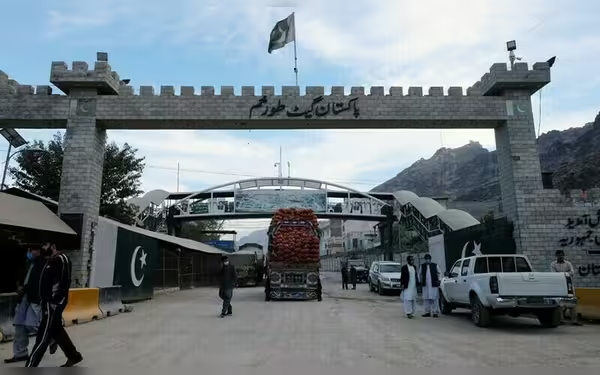Thursday, November 7, 2024 01:00 PM
Trade Resumption Between Pakistan and Afghanistan at Torkham Border
- Torkham trade resumes after Kukikhel blockade.
- Customs officials report $2.5 million daily losses.
- Protests against new goods clearance policy at Machni.
 Image Credits: dawn
Image Credits: dawnTrade between Pakistan and Afghanistan at Torkham border resumes slowly after Kukikhel blockade, highlighting ongoing challenges and economic losses.
Trade between Pakistan and Afghanistan via the Torkham border has slowly resumed after a significant disruption that began on August 21. This disruption was caused by hundreds of Kukikhel tribesmen who blocked the main Peshawar-Torkham Highway, demanding the return of over 6,000 displaced families to their homes in Rajgal and the surrounding areas of Tirah Valley. The blockade halted bilateral trade, which is crucial for both countries, and left many truckers and traders in a difficult situation.
In the days following the blockade, heavy traffic was restricted on the main road, forcing truckers to seek alternative routes. Many opted for the challenging Shalman-Malagori route to transport goods to Peshawar or to cross into Afghanistan. This route, while necessary, is not without its difficulties. It is longer and in poor condition, with narrow turns that can lead to accidents, as reported by the drivers. Despite these challenges, truckers have managed to transport essential goods, including imported coal, soapstone, tomatoes, and grapes, albeit in limited quantities.
According to the drivers, the Shalman-Malagori Road can only accommodate 30 to 40 vehicles at a time due to its dilapidated state. They also mentioned that they had to stop using the Ali Masjid-Jabba Road because residents in the Jabba area were demanding money for what they called "safe passage." In contrast, the residents of Shalman and Malagori have been praised for their friendly behavior, as they resisted pressure to block the road to heavy traffic.
Customs officials at Torkham reported that the suspension of trade had resulted in losses of approximately $2.5 million daily due to halted exports, along with an additional loss of Rs550 million each day from suspended imports. Although the recent resumption of trade is modest compared to pre-blockade levels, it is a positive sign for traders and transporters who have faced significant losses during the closure.
While the main border crossing has remained open, pedestrian movement has decreased due to the challenging road conditions between Peshawar and Torkham. On average, around 3,000 people crossed the border daily, but this number has seen a decline.
In a related development, customs clearing agents protested against the new "Gate-in Policy" for goods clearance at the Machni checkpost instead of the main Torkham customs terminal. They expressed their concerns by holding black flags and insisted that they would not agree to goods clearance without electronic scanning and vehicle weighing. The agents emphasized that Machni is not part of the main Torkham terminal and warned that they would block goods clearance if the old procedures were not restored.
While the gradual resumption of trade between Pakistan and Afghanistan via Torkham is a welcome development, it highlights the ongoing challenges faced by traders and transporters in the region. The situation underscores the importance of stable trade routes and the need for effective communication and cooperation between local communities and authorities. As both countries work towards normalizing trade, it is essential to address the underlying issues that can disrupt this vital economic lifeline.













